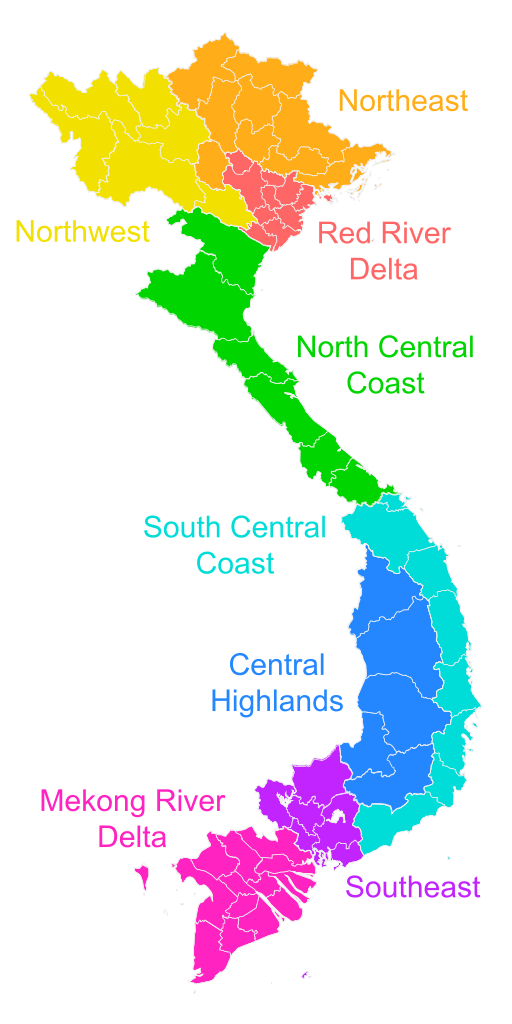Table of provinces per region

| Name | Population (2022) [1] | Area (km2) [1] [2] |
|---|---|---|
| Northern Vietnam (Bắc Bộ) | ||
| Northeast Vietnam (Đông Bắc Bộ) | ||
| Cao Bằng | 543,050 | 6,700.39 |
| Lạng Sơn | 802,090 | 8,310.18 |
| Phú Thọ | 1,516,920 | 3,534.56 |
| Quảng Ninh | 1,362,880 | 6,207.93 |
| Thái Nguyên | 1,335,990 | 3,521.97 |
| Tuyên Quang | 805,780 | 5,867.95 |
| Northwest Vietnam (Tây Bắc Bộ) | ||
| Điện Biên | 635,920 | 9,539.93 |
| Lai Châu | 482,100 | 9,068.73 |
| Lào Cai | 770,590 | 6,364.25 |
| Sơn La | 1,300,130 | 14,109.83 |
| Red River Delta (Đồng bằng sông Hồng) | ||
| Bắc Ninh | 1,488,200 | 822.71 |
| Hưng Yên | 1,290,850 | 930.20 |
| Ninh Bình | 1,010,700 | 1,411.78 |
| Hà Nội (municipality) | 8,435,650 | 3,359.84 |
| Hải Phòng (municipality) | 2,088,020 | 1,526.52 |
| Central Vietnam (Trung Bộ) | ||
| North Central Coastal Vietnam (Bắc Trung Bộ) | ||
| Hà Tĩnh | 1,323,750 | 5,994.45 |
| Nghệ An | 3,419,990 | 16,486.49 |
| Quảng Trị | 650,950 | 4,701.23 |
| Thanh Hóa | 3,722,060 | 11,114.71 |
| Huế | 1,160,220 | 4,947.11 |
| South Central Coastal Vietnam (Duyên hải Nam Trung Bộ) | ||
| Khánh Hòa | 1,253,970 | 5,199.62 |
| Quảng Ngãi | 1,245,650 | 5,155.25 |
| Đà Nẵng (municipality) | 1,220,190 | 1,284.73 |
| Central Highlands (Tây Nguyên) | ||
| Đắk Lắk | 1,918,440 | 13,070.41 |
| Gia Lai | 1,590,980 | 15,510.13 |
| Lâm Đồng | 1,332,530 | 9,781.20 |
| Southern Vietnam (Nam Bộ) | ||
| Southeast Vietnam (Đông Nam Bộ) | ||
| Đồng Nai | 3,255,810 | 5,863.62 |
| Tây Ninh | 1,188,760 | 4,041.65 |
| Hồ Chí Minh City (municipality) | 9,389,720 | 2,095.39 |
| Mekong River Delta (Đồng bằng sông Cửu Long)1 | ||
| An Giang | 1,905,520 | 3,536.82 |
| Cà Mau | 1,207,630 | 5,274.51 |
| Đồng Tháp | 1,600,170 | 3,382.28 |
| Vĩnh Long | 1,028,820 | 1,525.73 |
| Cần Thơ (municipality) | 1,252,350 | 1,440.40 |
1 – a.k.a. Southwest Vietnam (Tây Nam Bộ)